How to Take Care of a Newborn Baby
- Neonate or Newborn baby- The foetus born from the mother’s body is known as a neonate. Lot of caution and patience is required to take care of the newborn. Dealing with the child should be tender. The child stays in the womb for 9 months where he gets suitable protection and temperature.
Physical activities of the newborn after birth
- Pulmonary respiration
- Beginning of digestion
- Establishment of changes in blood circulation
- Temperature control
- Develops disease resistance
Artificial nourishment of baby
- Mother’s milk is nectar (Amrit) for baby’s life. No milk is better and superior for the baby than the mother’s milk. It is microbe-free, always available, unrefined with less renal solute and more goodness. While breastfeeding one hand should be kept in such a position that it supports child’s neck. Make sure baby’s nose is not pressed to avoid any difficulty in breathing. After the baby drinks the milk, mother should gently hold the baby over shoulder and rub her hands on baby’s back to cause belching which removes air from alimentary canal of the baby and thus, the milk gets digested easily. Mother should be happy while breastfeeding and be careful and lovable at the same time. In some cases when mother cannot breastfeed, the baby has to depend on milk of cow, buffalo, goat or preserved bottle milk.
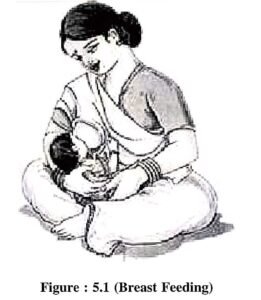
- The milk other than mother’s milk which is given as nourishment to the baby is called formula. From the point of nutrition and digestion cow’s milk is best for the baby but when cow milk is not available then milk of buffalo, goat or milk powder can be given.
Fundamental principles to prepare formula
- Milk should be fresh, clean and microbe-free.
- When formula is prepared, care should be taken to see that it fulfills the need of baby’s weight, energy and strength.
- It should be digestible.
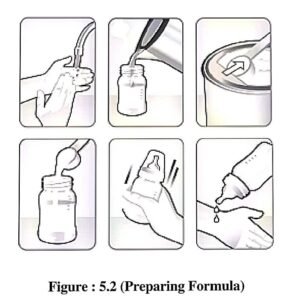
Cleaning of bottle
- For cleaning purpose a wide mouth bottle should be used. Disinfection by proper cleaning of bottle and nipple is very important. Bottles can be cleaned by scrubbing with a brush using detergent or soap with water. After this, bottle should be disinfected by boiling it in covered boiling water.
Nipple
- Nipple should be washed immediately after milk is fed to the baby.
- Inside and outside of nipple should be cleaned by scrubbing with a brush.
- Nipple should be washed in hot water and not in boiling water.
- Washed nipple should be kept in wide mouth bottle, jar or covered plate to keep it contamination free.
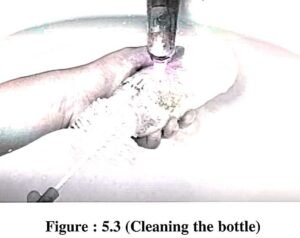
Method of feeding from the bottle
- Child should be fed from the bottle in the same way as breastfeeding.
- Hold the baby in lap and lift the head up.
- Milk should be fed as long as the baby wants. Once the baby drinks milk to full capacity, he himself will stop drinking.
- Wipe the face of baby and hold the baby over shoulder, rub hands on baby’s back for 10-15 minutes to cause belching.
Baby shower :-
- Bathing and hygiene of body parts for the baby is very important. Bathing opens the pores of skin from which contaminated material is ejected easily.
Method of bath
- Keep important articles such as bath tub, boric lotion, oil, towel, clothes, powder etc ready so that bathing is not disrupted. Before taking the baby for bath check the temperature of water. Water should neither be hot nor cold. Check the water either by dipping the elbow in it or using a thermometer.
- Oil massage should be done before taking the baby for bath. While bathing massage the soap on baby’s body using a soft cloth and then rub the soap with hands. Gently rub the soap behind the ears, under the arms, on the neck, elbow, thighs and legs. Lay the baby on stomach and clean the backside of body.
- Now slowly hold the baby with both hands and put the baby in bathtub. Lift the shoulders with left hand and support the head on left arm. Support the back using right hand. Keeping the baby in this position, wash off the soap from the body. Thereafter wipe the body with towel, apply lotion and make the baby wear clothes.
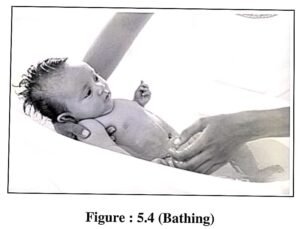
Excretion
- Initially the bowel muscles contract being uncomfortable before excretion. This is the early sign of defecation. The baby defecates immediately without waiting. The baby excretes irregularly many timesina a 24 hour long day. He stays awake only if he is day. Generally before 6 months the defecation remains irregular. But when the baby starts taking solid food, cow’s milk along with mother’s milk, the time of defecation becomes regular. The mother gets to know baby’s defecation time from the 1* month itself. The mother can make the baby sit on a pot for defecation consumption a little early than his regular time. In this way the baby soon learns to use the pot on his own for defecation. Before the child is made to sit on a pot on his own, it should be ensured that -his muscles in the back are fully developed, he is able to by himself in the sitting position and he is fearless to sit by himself.
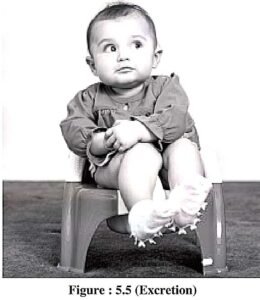
Rest and sleep
- For increasing working capacity and self activity of a child it is important to give some rest to his brain and neurological system. Sleep is a feature of health. If the baby is unable to sleep it must be understood that his body has some sort of problem or difficulty. Time of sleep- a healthy baby sleeps for 22 hours in a 24 hours log day . He stays awake only if he in hungry or needs to defecate. These sleeping hours gradually decrease as the baby grows in age.
Reasons for sleeplessness
1. Improper digestion of food
2. Wet clothing due to defecation
3. Heavy stomach due to excess of milk
4, Hunger or thirst
5. More cold or heat stroke
6. Tight clothing
7. Noisy environment
8. If the baby is sick suffering from fever, stomach ache or cough-cold.
Important points for deep sleep
- Clean room with fresh air
- Proper digestion of food
- Mental peace
- Good health
- Proper bed
How to make baby’s bed
- A good sleep is important for a baby and a good bed is important for a good sleep. For this it is necessary that baby’s bed is clean and soft. The shape of baby’s bed should be correct. Bed should not be wet in any way. A pillow should support baby’s head. The blanket covering the child should be soft and not heavy.
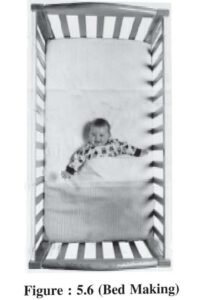
Home Science Latest Post :- Click Here
Important Points of Maternal and Post-Natal Care :-
- The immediate care of a newborn child is done by the doctor, nurse or a trained midwife.
- After childbirth mother needs a lot of rest. Mother should take nutritious food along with avoiding laborious work.
- Lot of caution and patience is required to take care of the newborn.
- Breastfeeding by mother provides the nourishment to the baby. In some cases when mother cannot breastfeed, the baby has to depend on milk of cow, buffalo, goat or preserved bottle milk .
- Clean the bottle properly after formula is prepared.
- Before taking the baby for bath check the warmth of water and keep important articles such as bath tub, boric lotion, oil, towel, clothes, powder etc, ready.
- The baby needs some practice to defecate in a pot. Gradually he learns to do it by himself.
- For a good sleep, baby’s bed should be clean and soft.
Maternal and Post-Natal Care Questions-Answers
1. Who takes care of a newborn?
(a) Doctor
(b) Nurse
(c) Trained midwife
(d) all of these
Click to show/hide
2. What is given to eat to a mother after normal delivery?
(a) Stodgy food
(b) fried food
(c) Spicy food
(d) kedgeree, porridge
Click to show/hide
3. The milk other than mother’s milk which is given as nourishment to the baby is called —
(a) Colostrum
(b) formula
(c) Pasteurized food
(d) fat rich milk
Click to show/hide
4. | Which bottle should be used keeping in mind its cleaning?
(a) small- mouth
(b) wide mouth
(c) Round mouth
(d) narrow mouth
Click to show/hide
5. The temperature of water used for baby’s bath should be
(a) Too hot
(b) too cold
(c) Neither hot nor cold
(d) none of these
Answer :- ?????
